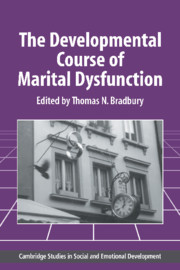Book contents
- Frontmatter
- Contents
- List of Contributors
- Foreword
- Introduction: The Developmental Course of Marital Dysfunction
- Part I Conceptual and Empirical Contributions
- Part II Invited Commentaries
- 12 On Intervention and Relationship Events: A Marital Therapist Looks at Longitudinal Research on Marriage
- 13 A Developmentalist's Perspective on Marital Change
- 14 Couples, Gender, and Time: Comments on Method
- 15 On the Etiology of Marital Decay and Its Consequences: Comments from a Clinical Psychologist
- 16 Problems and Prospects in Longitudinal Research on Marriage: A Sociologist's Perspective
- 17 A Social Psychological View of Marital Dysfunction and Stability
- Author Index
- Subject Index
17 - A Social Psychological View of Marital Dysfunction and Stability
Published online by Cambridge University Press: 13 October 2009
- Frontmatter
- Contents
- List of Contributors
- Foreword
- Introduction: The Developmental Course of Marital Dysfunction
- Part I Conceptual and Empirical Contributions
- Part II Invited Commentaries
- 12 On Intervention and Relationship Events: A Marital Therapist Looks at Longitudinal Research on Marriage
- 13 A Developmentalist's Perspective on Marital Change
- 14 Couples, Gender, and Time: Comments on Method
- 15 On the Etiology of Marital Decay and Its Consequences: Comments from a Clinical Psychologist
- 16 Problems and Prospects in Longitudinal Research on Marriage: A Sociologist's Perspective
- 17 A Social Psychological View of Marital Dysfunction and Stability
- Author Index
- Subject Index
Summary
For those of us who believe that a science of interpersonal relationships is critical to the further development of the social and behavioral sciences as well as to the practice of relationship therapy, the longitudinal expeditions into marital relationships chronicled in this volume make an important contribution. Together with the precious few longitudinal studies of relationships conducted previously, they represent a small island of terra firma in that vast sea of studies that observe behavior at only a single point in time. Such single-shot studies, which have characterized the marital satisfaction and stability literature for many years, have “produced only a modest increment in understanding of the causes and consequences of marital success” (Glenn, 1990, p. 818).
More immediately and personally, these authors' accounts inspire feelings of admiration for those who have undertaken the arduous longitudinal march and returned to tell the tale. Who cannot wince in sympathy with Kurdek's (this volume) aside that he came to dread the publication of yet another set of marriage licenses, signaling the opportunity to recruit additional research participants but also the investment of yet more time and tedium in their pursuit? And who cannot be impressed with the grit required to track down and enlist the further cooperation of couples last seen more than a decade ago (e.g., Hill & Peplau, this volume; Huston & Houts, this volume)? And so who can put this volume down without appreciating why, as Lindahl, Clements, and Markman (this volume) observe, so few young investigators, confronted with the publish-immediately-or-perish pressures of academe as well as ever-diminishing research funds, are electing to take the longitudinal route to furthering our understanding of relationships?
I take it as a given, then, that the contributors to this volume deserve battle ribbons, not kibitzing from spectators however well meaning.
- Type
- Chapter
- Information
- The Developmental Course of Marital Dysfunction , pp. 441 - 460Publisher: Cambridge University PressPrint publication year: 1998
- 11
- Cited by



